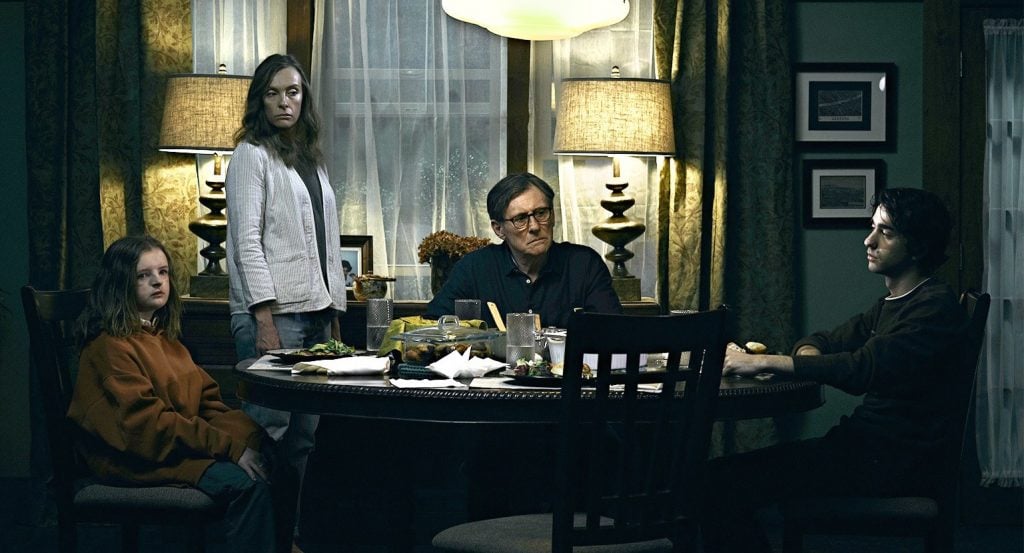‘Hereditary’ Isn’t The Scariest Film Ever, But It’s Definitely One Of The Most Horrifying
Words like "scary" and "terrifying" are deeply inadequate for a film like this.

Content warning: discussion of mental illness and suicide
—
When it premiered at Sundance a few months ago, Hereditary was hailed as the scariest film ever. This is not true.
Hereditary isn’t scary, it’s horrifying. It draws a sharp line between those two sensations, making “scary” and “terrifying” sound like very inadequate descriptors. Before I saw it, I spent a day steeling myself for jump scares, tension, the adrenaline rush of a good horror film. Instead, I encountered a very different kind of film, one that swapped adrenaline for a kind of gnawing queasiness and sense of bleak dread that hung around for hours after leaving the cinema. This was horror stripped back to its basic dictionary definition, “an intense feeling of fear, shock, or disgust”.
That horror works best fresh, so I’ll try to avoid spoilers in this review. Suffice to say that Hereditary centres on a family with a traumatic history: mother Annie (Toni Collette) has just lost her own mother, with whom she had a very strained relationship, and is navigating grief in the midst of her own family, which is strained in different ways.
There’s her daughter, Charlie (Milly Shapiro), a deeply unsettling thirteen-year-old who calmly does gruesome things while standing and eating chocolate, and her son, Peter (Alex Wolff), a withdrawn teen who tries desperately to avoid everything as fatal mistakes pile up around him. Their father, Steve (Gabriel Byrne), is the film’s most stable character, and we see him struggle to support his disintegrating family as he himself is slowly eroded by that experience.

Early in the film there’s a scene at a grief counselling group where Annie details her family history of mental illness: dissociative identity disorder, schizophrenia, traumatic sleepwalking incidents and suicide all get a mention. This moment, I think, is key to understanding Hereditary: the rest of it feels like an unsettling exploration of the horror psychotic mental illness can visit on a mind, and the way that horror is multiplied in families where those traits are, pardon the pun, hereditary.
I come from a family with a history of severe mental illness, which threads its way through generations similar to the ones in this film. Few things scare me more than accidentally doing something to trigger what I have no doubt inherited, and this film reflected that fear back at me for a long two hours. Hereditary makes no explicit claim to represent mental illness, and I can’t speak to whether it was ultimately a good or a damaging representation, but I can say that it perfectly expressed a fear of something shifting in your brain, beyond your control, inflecting your world with a terror, dread or uncertainty you’re unable to shape or contain or wake up from. One that just keeps unravelling and commands you to watch.
“The entire thing is underscored with dread. There’s no turn, no redemption, no resolution, no determined third act where, renewed with a sense of purpose and a defined enemy, the film’s abject horror is sapped a bit”
This film contains several of the most traumatic scenes I have ever watched, and I don’t use that word lightly. In all of these scenes, characters’ heads are central, which makes it all the more personal. The entire cast of this film seems to be trying to exorcise something from their brains, from within a world where the lines between mind and experience are indelibly blurred.
This makes for an extraordinary film, but not an enjoyable one. All four of the main cast of actors shine in their roles — the two younger actors, in particular, are stunning in their ability to embody the horrific nature of certain scenes — but the entire thing is underscored with dread. There’s no turn, no redemption, no resolution, no determined third act where, renewed with a sense of purpose and a defined enemy, the film’s abject horror is sapped a bit. There’s not even really anything to fight or fear in this film except the characters’ own minds, which makes Hereditary feel inescapable.
In short, don’t see this film expecting a thrill — and think twice about seeing it if there’s particular trauma in your past you’d prefer wasn’t evoked — but strongly consider seeing it. Hereditary pushes the horror genre to a different extreme than the one we’re used to, reminding us of the immense gulf between mere “scary” and “horrifying”, and the result is like nothing you’ve ever seen.
—
Sam Langford is one of Junkee’s Staff Writers. She is on Twitter at @_slangers.


